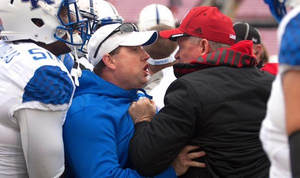 Relief. That's all I can say after the debacle that was the 2018 University of Louisville football season. We should have known it would go off the rails when the coaching staff was surprised Tua started for Alabama. Followed by struggle wins against mediocre opponents and then consistent blowouts in a down ACC... Man. It was brutal. And it was perfectly capped with an embarrassing home loss to Kentucky, in the process making them look like a Big 12 offense. The blame for the disaster is widespread: recruiting woes, nepotism in coaching hires, a revolving door of cast off coordinators, scandal throughout the rest of te university, and a fan base that still doesn't know when kickoff starts. Ultimately though, it was an issue of leadership. The mark of our effectiveness as a leader isn't what we do when we're there, it's what happens when we're not there. The reality is that all of us are serving as interims. We'll leave, we'll die, we'll get fired, and someone else will take our place. If we've done our job as leaders well, things will be better when we left than how we found them. This isn't something we do when we're on the way out, it happens from Day 1. 1. We raise up others to carry the leadership mantle - You can't do everything alone, and you need others to come through the pipeline of leadership. Recruiting, developing, equipping, and empowering others for leadership should be a priority for all of us. Think about it now, can you name 5 people who can step in if you got hit by a bus? 2. We deflect from ourselves - This isn't just a business concern, it affects churches all the time. When a church makes everything center around its pastor or its leadership, including its identity, it's built on a house of cards (see the Driscoll & Hybels fallouts) that may not survive. We deflect from ourselves by giving others credit, by setting others up for success, and by keeping everything we do mission focused. 3. We shoulder blame - Spreading blame is something that toxic cultures do, it stems from a lack of accountability and expectations. Just as leaders should be quick to deflect credit/praise, we should be quick to accept blame. When we throw others, our staff members, our lay leaders, our volunteers, under the bus, we're doing exactly what Adam & Eve did when they were confronted with their sin: they passed the buck and refused to accept consequences. 4. We focus on culture - Peter Drucker famously has said "culture eats strategy for breakfast." In other words, no matter how much we plan things or how much effort we put into vision, we will always default to who we are. Organizational culture is what's accepted, what's celebrated, and what's normal. If you're a football coach loose with the rules and looking the other way when players get in trouble with the cops, it should come as no surprise that you get penalty flags. If you're a leader who creates a culture of teamwork, optimism, and commitment, you're going to have a culture that will last through adversity. 5. We come in with humility, and we leave with grace - It's really easy for us as leaders, even in the church, to buy into a Hang The Moon Syndrome when we arrive in a new ministry. It's exciting, people are happy you're there, you score some easy wins, and before long you think you've hung the moon and you promise or expect something they're not ready for. When we come in with humility, we don't pretend we're the guy/gal with all the answers, but instead we approach as a learner and fellow journeyman with the church. Leaving with grace goes similarly, we speak well, we hug, we laugh, we cry, and we take the high road. Leaving with grace says you don't leave with bad feelings or untended wounds. It says you're not the key to hold everything together. And it says it really wasn't about you. Pastors, how have you left a place better than you found it?
0 Comments
Leave a Reply. |
Scott M. DouglasA blog about leadership and the lasting legacy of family ministry. Archives
August 2023
Categories
All
|
 RSS Feed
RSS Feed



